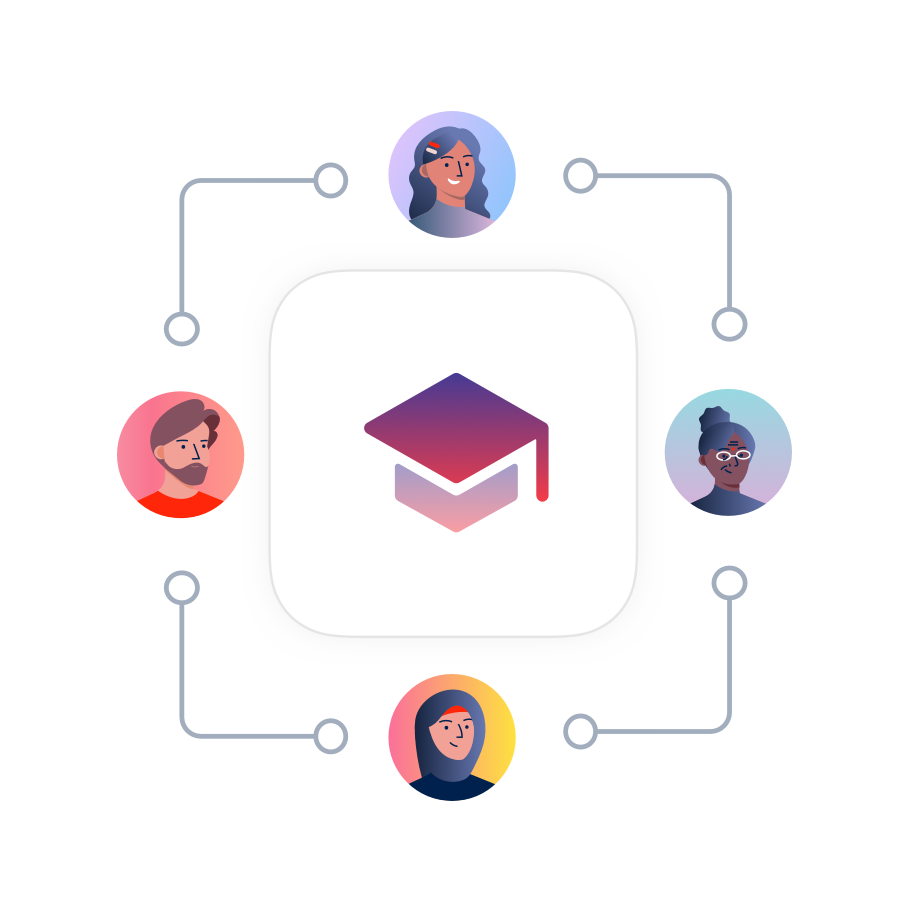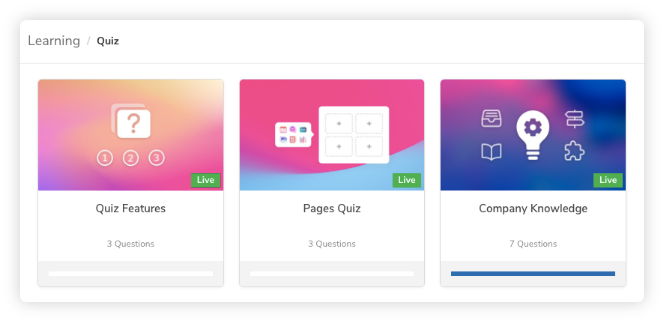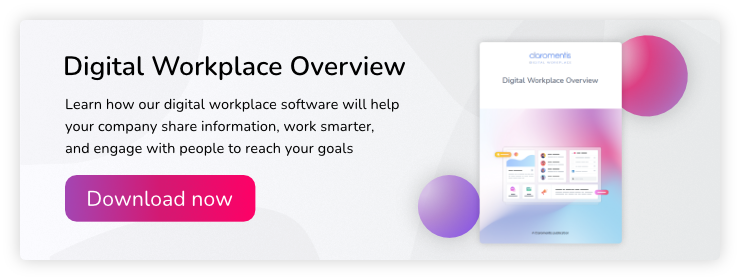LMS software is becoming an essential part of an organisation’s digital workplace toolkit, especially as many businesses look to adopt a remote-first or hybrid working approach.
In fact, a recent report by LinkedIn Learning found 64% of L&D professionals agree that learning and development has shifted from being a “nice to have” to a “need to have” in 2021.
Before we look into the reasons why, let’s first understand what an LMS is.
What is a Learning Management System?
An LMS, meaning Learning Management System, is a type of software that provides teams with a suite of tools to improve their knowledge and skills. Staff get access to training content and learning materials such as e-learning courses and quizzes, whilst team leaders can track learner progress such as course completion rates, all within the same online training hub.
A Learning Management System (LMS) was traditionally used to complement existing corporate training programs. These days, however, modern LMS software is more than comprehensive enough to provide a complete learning experience for your teams.
For instance, LMS technology enables staff to build their own personalised learning programs that suit their learning style and ability. Indeed, some people learn better by watching videos and tutorials, whilst others prefer to absorb information via reading materials. In this way, an LMS empowers teams to tailor their own personal development program.
What is e-learning?
An LMS and e-learning system are generally considered synonymous. However, some make minor distinctions between the two.
For instance, an LMS is thought of as providing more functionality – specifically analytics and reporting – than an e-learning platform.
What are the benefits of using an LMS?
Using an LMS for training employees will yield many benefits, including:
Time savings: Creating your organisation’s training program using an LMS will save time compared to traditional methods, such as external classroom training that requires extended travel or whole days away from work.
Flexible: With an LMS, staff can dip in and out of their online training programs at a time that suits them, whether that’s a morning every week or whenever they feel inspired to learn. This level of flexibility contrasts with traditional training programs, which are restricted by set times, dates, and locations.
Centralises training content: Learning Management Systems keep all learning content – from training courses and quizzes to events and analytics – in one central place. This makes it much easier for staff and team leaders alike to locate the information they need, and avoids having to store content across various systems and risk losing valuable data.

An LMS centralises all learning content in one place
How can an LMS benefit your workforce?
Beyond the obvious benefits above, why is learning and development becoming a must-have for modern workplaces?
To help uncover the answer, we can turn to the key stakeholders in any business – human resources, operations, and IT – to understand the reasons why LMS software is essential.
3 reasons why an LMS benefits HR teams
HR teams wear many hats. Not only are they handling the day-to-day admin tasks like managing leave requests and staff sickness, they also need to drive strategic initiatives such as onboarding, employee engagement, and performance. With so many priorities fighting for attention, it can be difficult to remain focussed.
An LMS, in HR terms, will be indispensable, because it provides staff with the tools to fulfil the daily admin, as well as deliver the long term strategies that bring more value. Here’s how:
Encourages staff autonomy: Admin tasks are draining 20% of HR’s time, according to a recent report by HRreview. Absence and sickness requests are examples of admin tasks that should be self-service, rather than managed by HR, that staff can manage themselves.
By using an LMS to train staff how to submit leave requests on your holiday booking system, you empower them to work autonomously, whilst also saving you time from low-value tasks.
Improves employee engagement: Employee engagement is a major strategic goal for HR, and it rests on having a strong personal development program. Indeed, leadership expert Brent Gleeson argues that employee engagement simply cannot improve without proper training and development.
Boost employee engagement levels by investing in an LMS that nurtures your teams’ thirst for knowledge. Even better, look for Learning Management Systems that incorporate gamification features such as quizzes, badges, and points to encourage participation and drive motivation.

Use gamification features such as quizzes to boost engagement
Enhances staff performance: Using an LMS makes it much easier to keep track of and assess staff performance, because course participation and completion rates are fully audited within the system.
This valuable data allows HR managers to spot if anyone is struggling with a particular course, at which point they can offer additional support. You can also uncover any trends in learning behaviour, and use these insights to make improvements to your learning programs.
3 reasons why an LMS benefits operations teams
Your operations teams are key to ensuring the business runs smoothly, efficiently, and cost effectively. All of these elements are reliant on having staff who are knowledgeable and productive – and this is where an LMS comes into play.
Reduces costs: It’s no secret – training courses can be expensive, especially when travel or accommodation costs are involved. Whilst there’s certainly value in traditional classroom-based training, it’s often cost-prohibitive for smaller businesses or organisations who are tightening their budgets.
Implementing an LMS is a cost-effective way of delivering training across your entire company. What’s more, you won’t need to worry about limiting numbers to reduce costs, because the system is hosted online and accessible to all staff.
Improves compliance: Compliance with policies and data regulations is at the top of every operations manager’s to-do list. So too is ensuring that staff truly understand the policies and procedures they’re complying with.
An LMS makes this job much easier, because you can create dedicated training courses that teach staff about the essentials that form each policy or regulation.
In fact, we did this ourselves at Claromentis as part of our commitment to being HIPAA compliant. Rather than pushing out complex policies and expecting everyone to understand and comply, we delivered LMS training to inform teams of the changes and explain how it would impact their role. Staff feedback – and compliance rates – were overwhelmingly positive as a result of this.
Boosts efficiency: Not knowing or feeling unsure about what to do is a major efficiency and productivity blocker. So by investing in an LMS that nurtures personal development, this will have a knock-on effect of boosting efficiency throughout your business operations.
This is because staff will be knowledgeable – and therefore feel confident – in their ability to carry out skilled work. By training up your staff, you also improve productivity by reducing the number of mistakes that lead to delays or duplicated work.
3 reasons why an LMS benefits IT teams
IT teams may be worried about the impact of having to manage an LMS. After all, isn’t it just another piece of software to install and maintain? But in fact, this isn’t the case. Having an LMS at your disposal will actually make working life easier. Here’s why:
Requires minimal maintenance: Most intranet suppliers will set up an LMS for you, as well as take care of maintenance, security updates, and cloud hosting. This will come as a relief for many IT teams, who are often overstretched and unable to maintain yet another system (a good example of why utilising just one digital workplace – rather than lots of different business apps – is the future of work).
The most that IT will need to do is create an account, so that staff can login and start learning.
Facilitates mobile learning: IT teams are increasingly having to manage multiple infrastructure types in order to adapt to hybrid working, such as maintaining desktop computers, cloud-based systems, and mobile devices.
A good LMS will work as effectively on mobile as it does on desktop, without any intervention from IT.
Provides a great user experience: In the past, Learning Management Systems and other business applications, like intranet software, required IT expertise to make it work and look nice. Even simple things, like changing colour schemes to match your organisation’s branding, would require code to get it right.
A modern LMS, however, is easy to customise thanks to revolutionary tech such as drag & drop functionality, which allows non-technical end-users to create engaging interfaces. This means your LMS will provide a great user experience out-of-the-box, whilst reducing your IT team’s overheads.






